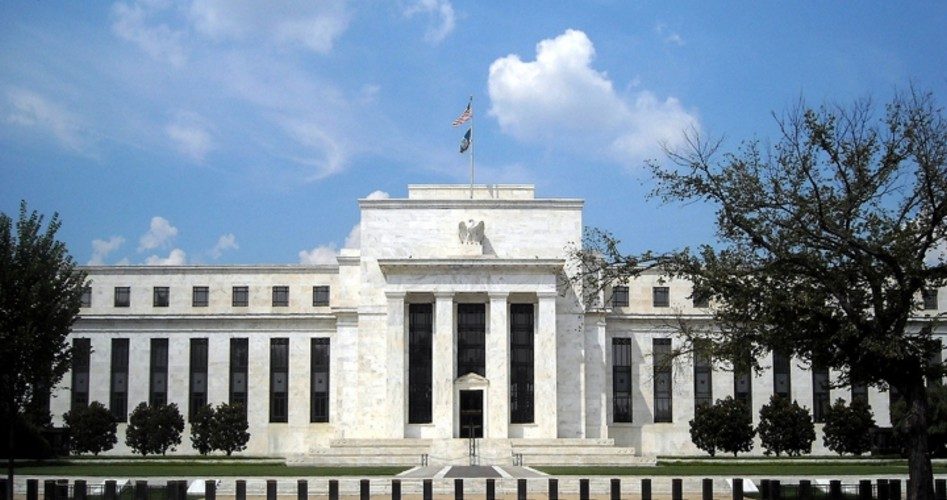
The Federal Reserve, which has showered literally trillions of dollars on U.S. and foreign mega-banks in recent years without any semblance of public oversight, can breathe a sigh of relief, for now at least. Democrats and one Republican in the U.S. Senate joined forces on January 12 to protect the secretive central bank from transparency and accountability, voting down the enormously popular “Audit the Fed” legislation that would have opened up the controversial bank’s books to government auditors.
A majority of senators supported the bill, with 53 in favor and 44 against. But it was not enough to overcome the 60-vote threshold needed to invoke cloture. Still, supporters of the bill vowed to keep pressing forward, saying the public has a right to know what the enormously powerful institution is doing to America’s money and economy behind closed doors. And in a passionate speech on the Senate floor, “Audit the Fed” sponsor Senator Rand Paul (R-Ky.), a GOP presidential contender, explained why the measure was both urgent and necessary.
The bill was supported by all GOP senators except one, Senator Bob Corker of Tennessee. Despite campaign slogans about reining in the bankers and Wall Street, transparency at the Fed was opposed by all Democrats except Senator Tammy Baldwin of Wisconsin. Senator Bernie Sanders, the Independent self-styled socialist from Vermont who normally votes with Democrats, also supported the measure. However, Sanders, currently running in the Democrat presidential primary, previously played a key role in sabotaging and watering down an earlier audit, sparking outrage among transparency campaigners.
Speaking on the floor of the Senate ahead of the vote, Senator Paul lambasted the secrecy that protects the Fed from accountability. “I rise today in opposition to secrecy. I rise today in support of Auditing the Federal Reserve. I rise in opposition to the lack of accountability at the Federal Reserve, an institution that has been far too long shrouded in secrecy,” Paul declared. “The objective of the Federal Reserve Transparency Act is simple: to protect the interests of the average American by finding out where hundreds of billions worth of our dollars are going.”
“The Federal Reserve has the ability to create new money and spend it on whatever financial assets it wants, whenever it wants, while giving the new money to whichever banks it wants,” Paul continued, referring to extraordinary and unconstitutional powers abused by the Fed, some of which it purported to grant itself amid the 2008 economic crisis. If an everyday American from Main Street tried to do those things, Paul added, they would be imprisoned as counterfeiters.
“Nowhere else but in Washington D.C. would you find an institution with so much unchecked power,” the senator continued, supported by a majority of the Senate, a super-majority of the House of Representatives, and some four out of five Americans in polls. “Creating new money naturally lowers interest rates, or the price of using money. Put another way, the Federal Reserve’s unchecked printing press creates a price control on the cost of using money.” Price controls, however, have never worked, Paul said, pointing to the housing bubble and other examples of Fed-created economic crises.
Since the 2008 financial crisis, the Fed’s balance sheet has ballooned from less than $1 trillion to more than $4.4 trillion, Paul continued. And while the Fed has been creating trillions of dollars in new currency out of thin air, most of that money is not finding its way into the hands of the average American, he said, noting that the income of the top one percent has been soaring in recent years while the income of everyone else has essentially remained flat or even declined in real terms.
“The reason for this is simple: big banks, corporations, and government entities receive the Fed’s money long before anyone else, and they bid up the prices of assets before the rest of us can get to purchasing them,” Paul said, citing a former Fed governor describing the central bank’s policies as the “reverse Robin Hood effect.”
One thing is certain, Paul added: “The Fed’s price-control on interest rates acts as a hidden tax on the less-well-to-do.” He also pointed to surging prices in everything from food to housing as evidence that the Fed’s monetary gimmicks are harming the poor and the middle classes while subsidizing Wall Street and the mega-banks.
“There is a revolving door between the Fed, the Treasury, and Wall Street — a revolving door in a building that is all-too-eager to enrich big banks and asset holders at the expense of everyone else,” Paul continued. “I think that it’s about time we pull back the curtain to uncover this cloak of secrecy once and for all.” Among other information, Paul said taxpayers should know who is receiving loans from the Fed, who the Fed is paying interest to, whether there are conflicts on how the payments are determined, whether there are checks and balances on the payments, and more.
“The Federal Reserve Act actually forbids the Fed from buying some of the troubled assets they purchased in 2008,” Paul continued. “Yet they did it anyway.”
Given all the unanswered questions and the sharp increase in risk surrounding the Fed’s balance sheet, it is “unquestionably necessary” for the Fed to be properly audited, Paul said. His three-page bill would provide for that audit by empowering the nonpartisan Government Accountability Office (GAO) to examine the Fed’s books. As of now, the GAO is not permitted to monitor, among other elements, monetary deliberations, open market transactions, agreements with foreign central banks, and more. Indeed, the Fed is so obsessed with secrecy that former Fed Chairman Ben Bernanke refused to tell Congress even which banks or governments received over a half-trillion dollars from the Fed.
“That’s right: the Fed swapped half-a-trillion dollars to foreign countries in secret and did not even have the decency, under testimony before Congress, to report the details to anyone,” Paul fumed in his plea for transparency before the Senate. “But it gets worse: Democratic Senator Bernie Sanders also asked Bernanke who received $2.2 trillion that the Fed lent out during the financial crisis. Again, Bernanke refused to give a direct answer.”
In the extremely limited, one-time audit approved in 2011, the GAO found that the Fed had created and lent out over $16 trillion to domestic and foreign banks during the financial crisis. To put that in perspective, $16 trillion is about the size of the U.S. Gross Domestic Product (GDP). Yet without that limited audit, Congress and the American people would have never known that the privately owned central banking system had conjured up that much money and showered it on establishment cronies.
“Both Republicans and Democrats agree that it is absurd we do not know where hundreds of billions worth of our money is going,” Paul continued, noting that last year, almost every Republican and more than 100 Democrats in the House supported the Audit the Fed bill. “Some say that an audit will politicize the Fed. I find this claim odd given both sides of the aisle’s support for the bill. The GAO is a nonpartisan, independent, works for Congress. It does not lean Republican or Democratic, and it is not interested in influencing policy. I can’t seem to understand how a simple check by the GAO to ensure that there are no conflicts of interest will politicize anything.”
“Like every agency, the Federal Reserve was created by Congress and is supposed to be overseen by Congress,” he said. “Auditing the Fed should not be a partisan issue. Regardless of one’s monetary policy views — regardless of whether you think interest rates should be higher or lower — everyone can and should agree that for the sake of our country’s economic well-being, we need to know what has been going on behind the Federal Reserve’s cloak of secrecy. It’s time we quit this guessing game. It’s time we audit the Federal Reserve once and for all to restore transparency to our nation’s checkbook.”
Of course, the privately owned central banking system and those who benefit from the corrupt arrangement have been lobbying fiercely against an audit for years. But public support for transparency at the Fed is massive while opposition is non-existent, polls show. The real solution to many of America’s problems, especially economic ones, would be to abolish the Fed and return to an honest, constitutional monetary system. But in the meantime, an audit exposing the Fed’s shadowy and dangerous activities to public scrutiny would be an excellent development. Americans should ensure that their elected officials continue pushing for transparency and accountability.
Photo: Federal Reserve Board Building in Washington, D.C.
Alex Newman is a correspondent for The New American, covering economics, education, politics, and more. Follow him on Twitter @ALEXNEWMAN_JOU. He can be reached at: [email protected].
Related articles:
With Democrats Out, Audit of Federal Reserve Gains Momentum
Vast Majority Want to Audit the Federal Reserve, Poll Shows
The Federal Reserve: Bankers for the New World Order
Fed Manipulations in the Crosshairs
House Passes Federal Reserve Audit Bill
Fed Audit: Trillions For Foreign Banks, Conflicts of Interest
Central Bankers Prepare to Flood the World with More Funny Money
Fed Nominee Yellen, a Staunch Inflationist and Establishmentarian
Jackson Hole Conclave: Central Bankers Plan Global Theft, Massive Pain
Fed Plotting to Monitor Critics, Tailor Propaganda
World Bank Insider Blows Whistle on Corruption, Federal Reserve
Fed Showered Money On Foreign Banks
Fed Wages PR Battle for Power, Secrecy
Congress Debates the Federal Reserve: Reform or Abolish?
U.S. Fed Bailout of Euro Prompts New Push for Audit & Sound Money




